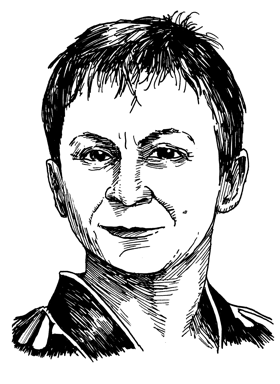
An interview with novelist and short-story writer Anne Enright appears in the Believer’s January issue, and we have for you here another Logger-exclusive portion of Conan Putnam’s conversation with Enright, featuring more about yoga, adapting Angela Carter stories for children, censoring oneself, and refusing to answer any questions about progress.
I. There will always be hills.
THE BELIEVER: You’ve said that you feel very much at home at your desk. Was it hard to take back your privacy after you won the Man Booker Prize in 2007 for “The Gathering”?
ANNE ENRIGHT: It was hard to get back a sense of creative territory, an uninvaded creative space after The Booker. But I don’t know if you do ever give up your privacy really. You have the persona that you have, that you present for public occasions. And you have the creative thing, something that you have to guard quite closely. Although I was worried about it, especially with my fiction, I was very careful, somehow, and I didn’t lose it.
BLVR: Maybe because it is so precious to you.
AE: Fiction certainly is more precious and somehow easier and more necessary for me than my journalism. I don’t make it important to the point that I become neurotic about it. It’s important like hills are important or the sea is important. It’s just there, you know? I console myself with the thought that there will always be hills.
BLVR: Can you talk a little bit about that state you need to be in when you are beginning a new book?
AE: Starting a new novel is always hard. It’s always fretful. You have to move through various stages of anxiety and agitation and then you have to wait for it all to subside. Exercise and yoga do not clear your head. It’s like a lot of things. You have to be cut off, at home in the silence, you know?
BLVR: Do you think that’s what attracts the muse back, that silence?
AE: I don’t believe in the muse. No. It’s just one sentence after the other. And I’m at a bad stage to be talking about this. It’s hard for me to discuss right now. I’m leaving on Monday for Germany for five days. And then I’m going to sit down and start the new book when I come back.
BLVR: Then we don’t have to talk about that.
AE: No. Don’t make me cry.
BLVR: I thought crying came at the very end of a book.
AE: Yeah. Crying comes at the end. I didn’t cry at any time during The Forgotten Waltz but I was surprised at the end at how much...
You have reached your article limit
Sign up for a digital subscription and continue reading all new issues, plus our entire archives, for just $1.50/month.
Already a subscriber? Sign in




